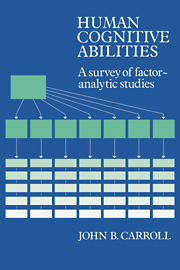Book contents
- Frontmatter
- Contents
- Preface
- PART I INTRODUCTION TO THE SURVEY
- PART II THE IDENTIFICATION AND DESCRIPTION OF COGNITIVE ABILITIES
- Chapter 5 Abilities in the Domain of Language
- Chapter 6 Abilities in the Domain of Reasoning
- Chapter 7 Abilities in the Domain of Memory and Learning
- Chapter 8 Abilities in the Domain of Visual Perception
- Chapter 9 Abilities in the Domain of Auditory Reception
- Chapter 10 Abilities in the Domain of Idea Production
- Chapter 11 Abilities in the Domain of Cognitive Speed
- Chapter 12 Abilities in the Domain of Knowledge and Achievement
- Chapter 13 Psychomotor Abilities
- Chapter 14 Miscellaneous Domains of Ability and Personal Characteristics
- Chapter 15 Higher-Order Factors of Cognitive Ability
- PART III ISSUES
- References and List of Datasets
- Appendix A Codes for Countries, Samples, and Factors
- Appendix B Hierarchical Factor Matrix Files
- Name Index
- Subject Index
Chapter 7 - Abilities in the Domain of Memory and Learning
Published online by Cambridge University Press: 29 September 2009
- Frontmatter
- Contents
- Preface
- PART I INTRODUCTION TO THE SURVEY
- PART II THE IDENTIFICATION AND DESCRIPTION OF COGNITIVE ABILITIES
- Chapter 5 Abilities in the Domain of Language
- Chapter 6 Abilities in the Domain of Reasoning
- Chapter 7 Abilities in the Domain of Memory and Learning
- Chapter 8 Abilities in the Domain of Visual Perception
- Chapter 9 Abilities in the Domain of Auditory Reception
- Chapter 10 Abilities in the Domain of Idea Production
- Chapter 11 Abilities in the Domain of Cognitive Speed
- Chapter 12 Abilities in the Domain of Knowledge and Achievement
- Chapter 13 Psychomotor Abilities
- Chapter 14 Miscellaneous Domains of Ability and Personal Characteristics
- Chapter 15 Higher-Order Factors of Cognitive Ability
- PART III ISSUES
- References and List of Datasets
- Appendix A Codes for Countries, Samples, and Factors
- Appendix B Hierarchical Factor Matrix Files
- Name Index
- Subject Index
Summary
Strength of memory is usually limited in every man to particular kinds of objects. … He who easily remembers the technical expressions of a science that interests him has often a bad memory for the novelties of town.
J. F. Herbart (1816)Learning and memory are broad, interrelated categories of behavior and performance that have received enormous attention in experimental psychology. Wide individual differences in learning and memory abilities have long been noted, and have been addressed in psychometric research. Unfortunately, there has been little interplay between experimental and psychometric approaches to these areas, with the result that little can be said about relations between processes studied in experimental investigations and the dimensions of individual differences isolated in psychometric research. In a recent review of memory measures (Richardson–Klavehn & Bjork, 1988) there was no reference to psychometric research, and only a little to individual differences as they occur in the contrast between normal and amnesic subjects.
Learning and memory are related because memory has to do with how the outcomes of learning are retained or forgotten. Nevertheless these categories tend to be treated, both in experimental and psychometric investigations, as if they were separate.
- Type
- Chapter
- Information
- Human Cognitive AbilitiesA Survey of Factor-Analytic Studies, pp. 248 - 303Publisher: Cambridge University PressPrint publication year: 1993



